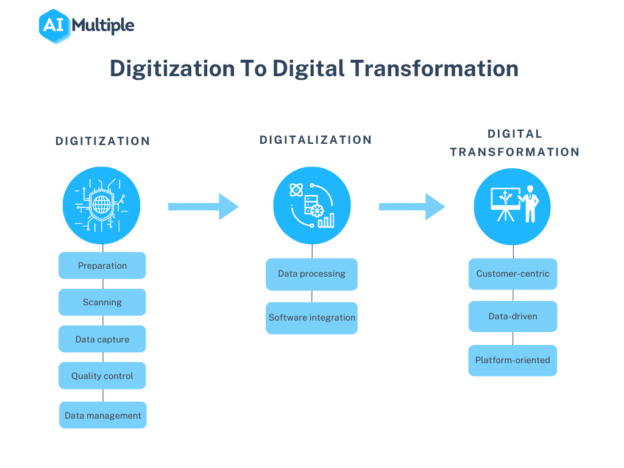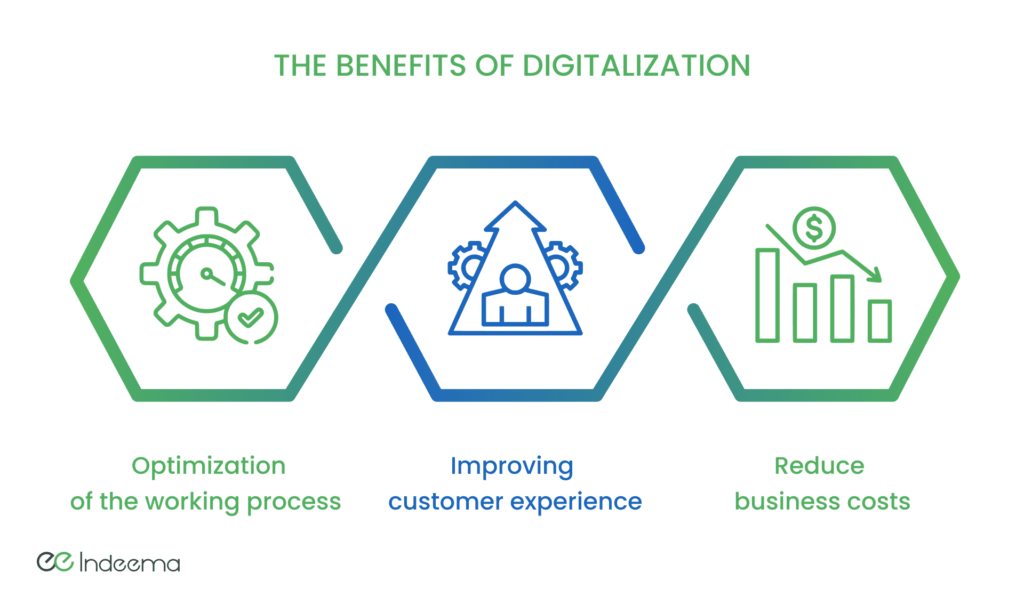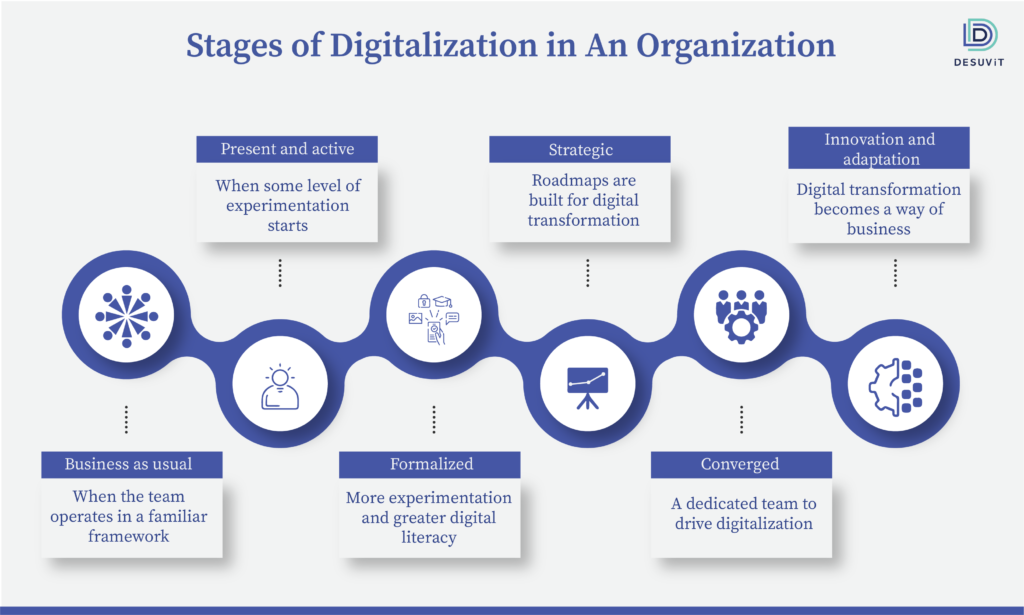You’ve probably heard the term “digitization” thrown around a lot lately, but have you ever wondered why it’s so important in the world of business? Well, let’s be honest, it’s pretty simple. In today’s fast-paced and technologically advanced world, digitization is the key to staying relevant and competitive. It’s all about taking your business processes, data, and operations and transforming them into digital formats. This not only streamlines operations, boosts efficiency, and reduces costs, but it also opens up a whole new world of opportunities for innovation and growth. So, whether you’re a small startup or a large multinational corporation, digitization is a game-changer that you simply cannot afford to ignore.

This image is property of pixabay.com.
Enhanced Efficiency and Productivity
Streamlined processes
Digitization is crucial for improving efficiency and productivity in businesses. By digitizing and automating processes, you can eliminate the need for manual tasks that are time-consuming and prone to human error. With streamlined processes, your team can focus on more strategic and value-added activities, ultimately increasing productivity and reducing operational costs.
Automation of tasks
Automation plays a vital role in enhancing efficiency in business operations. By automating repetitive tasks, such as data entry, report generation, and invoice processing, you can save valuable time and resources. Automation not only reduces the risk of errors but also allows your employees to focus on more critical tasks that require creativity and problem-solving skills.
Real-time data access
Digitization enables businesses to have real-time access to data. This means that you can monitor and analyze key performance indicators (KPIs) instantaneously, allowing you to make data-driven decisions on the spot. Real-time data access empowers businesses to respond rapidly to market trends, customer demands, and potential issues, ultimately improving overall efficiency and enabling proactive decision-making.
Improved Decision Making
Data-driven insights
Digitization provides businesses with the ability to collect and analyze vast amounts of data. By utilizing analytics tools and technologies, you can gain valuable insights into customer behavior, market trends, and operational performance. These data-driven insights allow you to make informed decisions that are based on evidence and facts, minimizing the risk of making poor choices.
Predictive analytics
Predictive analytics is a powerful tool enabled by digitization that allows businesses to forecast future outcomes and trends based on historical data. By leveraging predictive analytics, you can anticipate customer needs, identify potential risks and opportunities, and optimize business strategies accordingly. This proactive approach to decision-making can give your business a competitive edge in dynamic markets.
Market research
Digitization has revolutionized market research by providing access to a wealth of information and insights. Utilizing digital tools and platforms, businesses can gather data on customer preferences, market trends, and competitor analysis. This comprehensive market research enables you to identify new market opportunities, develop targeted marketing strategies, and stay ahead of the competition.
Better Customer Experience
Personalization and customization
Digitization enables businesses to provide personalized and customized experiences to their customers. By leveraging customer data and analytics, you can understand individual preferences, behavior patterns, and purchase history. With this knowledge, you can tailor your products, services, and marketing efforts to meet the unique needs and preferences of each customer, enhancing their overall experience and building customer loyalty.
Omni-channel presence
With digitization, businesses can establish an omni-channel presence, allowing customers to interact and engage with the brand seamlessly across multiple channels and devices. This unified customer experience improves convenience, accessibility, and satisfaction. Whether customers prefer to shop in-store, online, or through mobile devices, digitization ensures a consistent and seamless experience throughout their journey.
Efficient customer support
Digitization empowers businesses to provide efficient and effective customer support. Through the use of chatbots, self-service portals, and automated ticketing systems, businesses can address customer queries and issues promptly. These digital tools enable round-the-clock support, faster response times, and improved problem resolution, ultimately enhancing the overall customer support experience.
Cost Savings
Reduced paperwork
Digitization significantly reduces the need for paper-based documentation and manual record-keeping. By storing and managing documents digitally, businesses can save on costs associated with printing, storage space, and administrative tasks. Moreover, digitized documents can be easily searched, accessed, and shared, reducing time spent on document retrieval and enabling efficient collaboration.
Lower operational costs
Digitization often results in lower operational costs for businesses. By automating processes, businesses can save on labor costs and minimize errors caused by manual tasks. Additionally, digital tools and technologies can optimize resource allocation, inventory management, and supply chain operations, reducing waste and eliminating unnecessary expenses.
Optimized resource allocation
Digitization enables businesses to optimize resource allocation. With real-time data and analytics, you can accurately track resource utilization, identify areas of inefficiency, and make informed decisions on resource allocation. This optimization ensures that resources are allocated effectively, reducing waste and streamlining operations, ultimately leading to cost savings.

This image is property of pixabay.com.
Competitive Advantage
Digital marketing
In today’s digital era, a strong online presence is vital for businesses to remain competitive. Digitization allows businesses to leverage digital marketing strategies, such as search engine optimization (SEO), social media marketing, and content marketing. These digital channels enable businesses to reach a wider audience, enhance brand visibility, and engage with customers on a more personal level, gaining a competitive advantage in the market.
Faster time to market
Digitization accelerates the time-to-market for products and services. With digital tools and technologies, businesses can streamline product development processes, digitize design and testing phases, and collaborate with suppliers and partners in real-time. This faster time to market allows businesses to stay ahead of the competition, meet customer demands more efficiently, and capitalize on market opportunities promptly.
Agility and adaptability
Digitization enhances a business’s agility and adaptability in an ever-changing marketplace. With digital technologies, businesses can quickly respond to market shifts, customer preferences, and emerging trends. The ability to adapt and pivot swiftly enables businesses to remain competitive and seize opportunities, ensuring long-term growth and success.
Business Growth
Expanded market reach
Digitization opens up new avenues for businesses to expand their market reach. Through e-commerce platforms, businesses can reach customers globally, breaking geographical barriers and unlocking new markets. Additionally, digital marketing strategies and targeted advertising enable businesses to connect with niche markets and demographics, expanding their customer base and driving business growth.
New revenue opportunities
Digitization creates new revenue opportunities for businesses. By leveraging technology, businesses can offer digital products, services, and subscriptions, diversifying their revenue streams. Additionally, digitization allows businesses to explore innovative business models, such as subscription-based models or digital marketplaces, further expanding revenue opportunities and driving growth.
Scaling capabilities
Digitization equips businesses with the scalability needed for growth. With digital infrastructure and cloud-based solutions, businesses can easily scale their operations, adding new products or services, and accommodating increased customer demand. Digitization enables businesses to scale efficiently and cost-effectively, ensuring that they can keep up with growth without sacrificing quality or customer satisfaction.

This image is property of pixabay.com.
Improved Collaboration
Remote work and virtual teams
Digitization enables remote work and virtual teams, allowing businesses to tap into talent from diverse geographical locations. With digital communication tools, project management platforms, and video conferencing, teams can collaborate and communicate seamlessly, regardless of physical distances. This flexibility in collaboration ensures efficient teamwork, increased productivity, and access to a global talent pool.
Collaborative tools and platforms
Digitization provides businesses with a wide range of collaborative tools and platforms. Through cloud-based document sharing, project management software, and collaborative messaging platforms, teams can work together in real-time, share ideas, and track progress. These collaborative tools foster effective communication, transparency, and accountability, ultimately enhancing teamwork and productivity.
Efficient communication
Digitization improves communication within businesses. With digital communication tools, such as email, instant messaging, and video conferencing, employees can stay connected and informed, regardless of their physical location. Real-time communication enables faster decision-making, swift problem resolution, and efficient coordination, leading to improved collaboration and overall business productivity.
Enhanced Data Security
Secure storage and backups
Digitization allows businesses to store and back up data securely. By leveraging cloud storage solutions and encryption technologies, businesses can protect sensitive information from unauthorized access or loss. Secure storage and backups ensure that critical data is protected from cyber threats, hardware failures, or natural disasters, providing peace of mind and ensuring business continuity.
Access controls and permissions
Digitization enables businesses to implement access controls and permissions, ensuring that only authorized individuals can access specific data or systems. By setting up user privileges and user management protocols, businesses can mitigate the risk of unauthorized data breaches or internal data leaks. These access controls safeguard sensitive information, protecting the business’s reputation and customer trust.
Risk management
Digitization helps businesses manage and mitigate risks effectively. By automating risk assessment processes, businesses can identify potential risks, evaluate their impact, and develop risk management strategies. Furthermore, digitization enables real-time monitoring of security vulnerabilities and cyber threats, allowing businesses to respond promptly and proactively to protect their data and systems.

Better Analytics and Reporting
Real-time monitoring
Digitization provides the capability for real-time monitoring of business processes and performance. Through digital dashboards and analytics tools, businesses can track and visualize key performance indicators (KPIs) in real-time. Real-time monitoring allows businesses to identify emerging trends, track progress towards goals, and make data-driven decisions promptly, improving overall business performance.
Customizable dashboards
With digitization, businesses can customize dashboards to suit their specific needs and goals. Customizable dashboards enable businesses to visualize and analyze the most relevant data and metrics for their operations. By having access to a personalized dashboard, businesses can quickly identify areas of improvement, track performance, and gain insights for better decision-making.
Performance tracking
Digitization enables businesses to track and measure performance accurately. Through the use of digital tools and technologies, businesses can capture and analyze data related to sales, customer satisfaction, employee performance, and more. Performance tracking allows businesses to set benchmarks, monitor progress, and make data-driven adjustments to optimize performance and achieve business goals.
Environmental Sustainability
Reduced paper usage
Digitization contributes to environmental sustainability by reducing paper usage. By digitizing documents, businesses can significantly minimize their reliance on paper-based processes. This reduces deforestation, energy consumption, and waste associated with paper production and disposal. The shift towards digital documents also enables businesses to adopt more eco-friendly practices and support a greener future.
Energy-efficient operations
Digitization promotes energy-efficient operations for businesses. By utilizing cloud computing, virtualization, and energy-efficient hardware, businesses can optimize their IT infrastructure and reduce energy consumption. This not only lowers operational costs but also reduces carbon footprint and minimizes environmental impact. Embracing digitization allows businesses to operate more sustainably and contribute to a greener planet.
Remote collaboration
Digitization facilitates remote collaboration, which has environmental benefits. By enabling virtual meetings, remote work, and virtual teams, businesses can reduce the need for travel and commuting. This reduces carbon emissions, alleviates traffic congestion, and supports a more eco-friendly way of doing business. Remote collaboration is a positive consequence of digitization that contributes to environmental sustainability.
In conclusion, digitization plays a critical role in driving various benefits for businesses. From enhancing efficiency and productivity to facilitating better decision-making, improving customer experience, enabling cost savings, and fostering business growth, digitization is a key driver of success in the digital age. Additionally, digitization promotes collaboration, data security, analytics, reporting, and environmental sustainability. Embracing digitization enables businesses to stay competitive, adapt to market changes, and thrive in a rapidly evolving business landscape.







